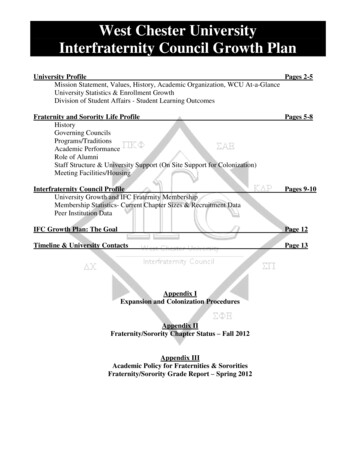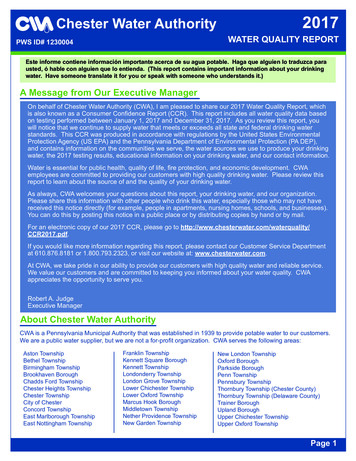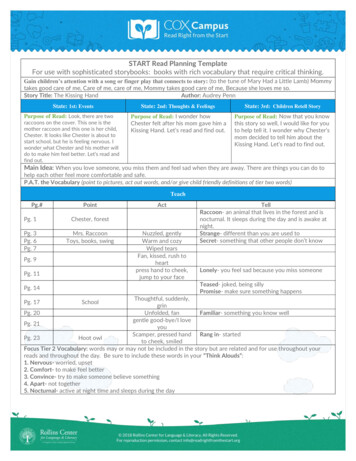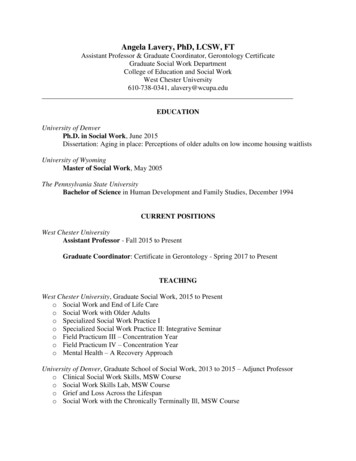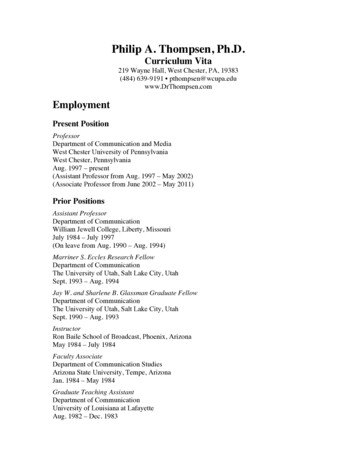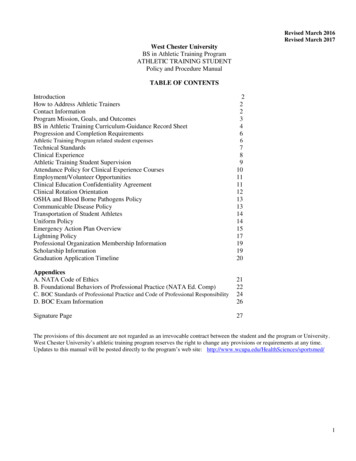
Transcription
Revised March 2016Revised March 2017West Chester UniversityBS in Athletic Training ProgramATHLETIC TRAINING STUDENTPolicy and Procedure ManualTABLE OF CONTENTSIntroductionHow to Address Athletic TrainersContact InformationProgram Mission, Goals, and OutcomesBS in Athletic Training Curriculum-Guidance Record SheetProgression and Completion RequirementsAthletic Training Program related student expenses2223466Technical StandardsClinical ExperienceAthletic Training Student SupervisionAttendance Policy for Clinical Experience CoursesEmployment/Volunteer OpportunitiesClinical Education Confidentiality AgreementClinical Rotation OrientationOSHA and Blood Borne Pathogens PolicyCommunicable Disease PolicyTransportation of Student AthletesUniform PolicyEmergency Action Plan OverviewLightning PolicyProfessional Organization Membership InformationScholarship InformationGraduation Application Timeline78910111112131314141517191920AppendicesA. NATA Code of EthicsB. Foundational Behaviors of Professional Practice (NATA Ed. Comp)C. BOC Standards of Professional Practice and Code of Professional ResponsibilityD. BOC Exam Information21222426Signature Page27The provisions of this document are not regarded as an irrevocable contract between the student and the program or University.West Chester University’s athletic training program reserves the right to change any provisions or requirements at any time.Updates to this manual will be posted directly to the program’s web site: http://www.wcupa.edu/HealthSciences/sportsmed/1
INTRODUCTIONOur Athletic Training Program accredited by the Commission on Accreditation of Athletic TrainingEducation Programs (CAATE) affords students the opportunity to pursue a combination of classroom, laboratory andclinical educational experiences in athletic training. West Chester University has offered athletic training educationprogramming for students from this and other institutions since 1970. Students of West Chester University whocomplete the Athletic Training Program meet the eligibility requirements to sit for the national certificationexamination of the Board of Certification, Inc. (BOC). They will also meet the requirements for licensure as anathletic trainer by the Commonwealth of Pennsylvania. (It should be understood that completion of the program doesnot imply automatic certification as an athletic trainer by the BOC or licensure by the Commonwealth ofPennsylvania.)HOW TO ADDRESS ATHLETIC TRAINERS and ATHLETIC TRAINING STUDENTSIndividuals who have successfully completed the BOC certification examination are eligible to use the ATCinitials as part of their credentials, for example Sam Smith, ATC, and should be referred to as “Athletic Trainer” or“AT”. The use of the correct title will help end the confusion created when just the term trainer is used. Additionalinformation about BOC Certification, the ATC credential, and/or how to refer to athletic trainers, is available at theBOC and NATA web sites: http://www.nata.org/athletic-training/terminology; www.nata.org.Students enrolled in a CAATE accredited athletic training program should be referred to as “athletic trainingstudents”.DEPARTMENT OF SPORTS MEDICINE FACULTY/STAFF CONTACT SHEETMr. Dan Baerdbaer@wcupa.edu(610) 436-2139Dr. Nicole Cattanoncattano@wcupa.edu(610) 436-2250Dr. Neil Curtisncurtis@wcupa.edu(610) 436-2969Dr. Sandra Fowkes-Godeksfowkesgod@wcupa.edu(610) 436-2342Dr. Alison Gardiner-Shiresagardiner@wcupa.edu(610) 436-2515Dr. Scott Heinerichssheinerichs@wcupa.edu(610) 436-2733Dr. Carolyn Jimenezcjimenez@wcupa.edu(610) 436-3293Dr. Lindsey Keenanlkeenan@wcupa.edu(610) 436-2753Dr. Katherine Morrisonkmorrison@wcupa.edu(610) 436-1091Mr. John J. SmithJSMITH5@wcupa.edu(610) 436-2197Mrs. Wendy ShowersDepartment Secretarywshowers@wcupa.edu(610) 436-2119WCU South Campus athletic training facility –office phone, wall phone (610) 436-2932, 2933WCU South Campus athletic training facility – FAX(610) 436-2803WCU North Campus athletic training facility(610) 430-44152
Department Mission Statement:The Department of Sports Medicine prides itself on aligning with the University and College of Health Sciencesmissions by providing student access and high quality education. The program prepares students to becomecompetent athletic trainers through a combination of didactic and clinical educational experiences. Additionally theprogram values patient centered care with an emphasis on evidenced based practice. Upon completion of theprogram students will have the knowledge, skills, and abilities set forth by the Commission on Accreditation ofAthletic Training Education to pass the board of certification (BOC) examination and begin a career in one of manyemployment settings athletic trainers work in.Program Goals:To analyze, synthesize, and think critically to solve problems as they relate to the field of athletic training.To communicate and use information appropriately in the clinical setting with patients.To collaborate with a variety of healthcare providers to help in the decision making process for patient care.To prepare students to practice effectively as healthcare providers. Program and Student Learner Outcomes: AT students will be successful in graduating and gaining employment in the field of athletic training.Identify, describe, and explain concepts associated with the domains of athletic training education.Communicate effectively in the oral and written form using evidence based practice principles.Locate, evaluate, and use information related to evidence based practice.Develop and defend clinical reasoning skills in the clinical education setting when interacting with patients.3
WEST CHESTER UNIVERSITYBACHELOR OF SCIENCE IN ATHLETIC TRAININGGUIDANCE RECORD SHEETNameCourseWRT 120PSY 100SMD 100BIO 110First SemesterCreditsEff. Writing IIntro to PsychFound. Spts. MedGeneral BiologySPK 208, Arts, or other Gen. Ed.3.03.02.03.03.0Total CreditsDate Entered Athletic Training MajorCourseSecond SemesterCreditsWRT 200Critical Writing & Research3.0or 220 or 208 Special Topics or Writing for PrintMediaBIO 259 Human Anat/Phys I4.0SMD 204 First Aid Health Prof.3.0SML 204 First Aid Health Prof./Lab0.0SPK 208, Arts or other Gen. Ed.3.0BEH & SOC SCIENCE3.014Total CreditsCourseThird SemesterSMD 361 KinesiologySMD 272 Ath. Trg. Tech.or261 Surface Anatomy (3 credits)BIO 269 Human Anat/Phys IISPK 208, Arts, or other Gen. Ed.MAT 121 StatisticsTotal Credits16CreditsCourse Fourth Semester3.03.0EXS 380 Applied Ex. Physio.SMD 261 Surface Anatomyor272 Ath. Trg. Tech. (3 credits)SMD 312 Path/Evl Ath Inj IICHE 107Gen Chem Allied Health SciCRL 107Gen. Chem Allied Health labNTD303 Intro Nutrition4.03.03.0Credits3.03.03.04.01.03.016Total CreditsCourseSMD 311 SMD 313 SMD 315 SML 311 SMD 210 Fifth SemesterCreditsTher. Ex. ATPath/Evl Ath Inj IIIATH INJ MGMT ITher Ex. LabPsy/Soc Persp Sports Inj3.03.03.02.03.0CourseSMD 310 SMD 212 SMD 316 SML 310 17Sixth SemesterCreditsTher. Mod ATPath/Evl Ath Inj IAth Inj Mgmt IITher. Mod AT LabInterdisciplinary (“I” course)3.03.03.01.03.0Total CreditsTotal CreditsCourseSMD 414 SMD 417 SMD 454 PHY 100Seventh SemesterCreditsH.,O.,&A. of ATAth Inj Mgmt IIITher/Prac Cond.Elements Physical ScienceDiverse Communities (“J” course)Total Credits must earn C or better in these coursesprerequisites for fifth semester are in bold1314Course3.03.03.03.03.015Eighth SemesterSMD 418 Ath Inj Mgmt IVStudent ElectiveStudent ElectiveStudent ElectiveHumanities or other Gen. Ed.Credits3.03.03.03.03.0Total Credits15TOTAL CREDITS FOR WHOLE PROGRAM 1204
WEST CHESTER UNIVERSITYBS in Athletic TrainingADVISING GUIDELINES-General Education RequirementsI. Academic Foundations (18)A.English Writing Courses (6)Satisfied by WRT120 and WRT 200, 208 or 220B.Mathematics: (3)Satistisfied by MAT 121C.Communications (3)Satisfied by SPK 208D.Diverse Communities (3)One course with a J (Diverse Communities) designationE.Interdisciplinary (3) - One course with an I (Interdisciplinary) designation.An interdisciplinary course may simultaneously meet the interdisciplinary and foreign culture clusterrequirements. An interdisciplinary course may not be used to fulfill a general education requirement in the distributiveareas and may not simultaneously satisfy the interdisciplinary and diverse communities requirements. - SMD 210.II. Distributive Requirements (18) - *student is responsible to ascertain the course is Gen Ed approvedA.Sciences - 6 credits* (check approved list)Satisfied by PHY100,CHE/CRL 107, and BIO110 requirementsB.Behavioral and Social Sciences - 6 credits* (check approved list)Satisfied by PSY100 requirement plus 1 approved course from one other area:1. ANT, 2. SOC, 3. ECO, 4. GEO, 5. PSCApproved courses*: ANT 102, 103; SOC 200, 240; ECO 101, 111, 112; GEO 101, 103;PSC 100, 101, 213C.Humanities - 6 credits*: (check approved list)Satisfied by 2 approved courses from the following areas:Literature or Classics (check approved list)History –(check approved list)Philosophy (Recommended 101 or 180; check approved list)III. Arts* – (3) *student is responsible to ascertain the course is Gen Ed approved- Satisfied by taking 3 credits worth ofcoursework in approved art, cinematography, dance, music, photography, or theaterIV. Student Electives (9)Must be satisfied by courses not required by General Education or your major. The following constitutesome suggested classes for the students choice: EXL 380 Ex. Phys Lab, HEA 325 Stress Mgmt , HEA 206Human Development, PEA 137 Strength Training, CSC 101 Computers, BIO 214 Microbiology, BIO 307Pathophysiology (no lab), BIO 367 Physiology of Drug Interaction, PSY 375 Abnormal Psych , PSY 210Developmental Psych , PSY 350 Motivation , PSY 257 Theo. of Personality, EDA 102 Psych of the Phys.Disabled , KIN 465 Mech. Anal. of Motor Skills. Students interested in Medical School, PhysicalTherapy, or similar graduate programs should take CHE/CRL 103-104, and PHY/L 130-140, and anadvanced Biology course.V. Writing Emphasis Courses (one must be at 300-400 level) 9 credits. Note for transfer students:Transfer students whoenter with 40-70 credits must take 2 writing emphasis courses. Students who transfer with 70 credits must take 1 writingemphasis course.CourseTitleSemester/Year1. SMD 414H, O, & A of Athletic Training(required)Fall, Senior year2. SMD 210Psychosocial Perspectives of Sport/Recreational Injuries (required)Fall, Junior year3.VII. The student must achieve at least a "C" in each of these courses. The student must have a minimum combined GPA of2.5 in these courses in order to be recommended for the BOC Certification Exam: BIO 259, 269, EXS 380, NTD 303,SMD 204, 210, 212, 261, 272, 310, 311, 312, 313, 315, 316, 361,414,417, 418, 454, SML 310, 3115
ATP Progression and Completion RequirementsAthletic training students must complete the following courses prior to enrolling in the first clinical course(SMD 315): BIO 259, 269; EXS 380; SMD 100, 204,261, 272, 312, 361; SML 204,Athletic training students must achieve at least a “C” in each of the courses listed above.The student must also have a combined GPA of 2.5 in the courses listed below to be recommended forthe Board of Certification (BOC) exam:BIO 259, 269; EXS 380; NTD 303;SMD 204, 210, 212, 261, 272, 310, 311, 312, 313, 315, 316, 361, 414, 417,418, 454; SML 310, 311If students do not earn a C or better in EXS 380, SMD 204, 210, 212, 261, 361, 310, 311, 312, 313, 315, 316,SML 310, 311 students must retake the course at the next available offering including summer sessions whenapplicable. For example: if you earn a C- in a fall course that is only offered in the fall and summer, you mustrepeat it in the next summer session it is offered. Example 2: if you earn a D in a spring course that is onlyoffered in the spring and summer, you must repeat it in the next summer session it is offered.Athletic Training Program Retention PolicyThe BS in athletic training major uses the West Chester University retention policy that is found in theundergraduate course catalog.Athletic Training Program related student expensesAthletic Training Uniform items- estimated cost 200 (one-time expense)Athletic Training Student Liability insurance- estimated cost 35 (per year)Child Abuse Clearance and Criminal Background Checks- estimated cost 55 (per year)CPR certification and re-certification- prices vary, estimated cost 20 for renewalTransportation to clinical sites- variable; students are expected to have reliable transportation and are responsiblefor all transportation and housing costs;TB test (if applicable) - estimated cost 25Estimated total (not including transportation) 335 for first year of clinical courses; 135 for second year6
Technical Standards for the Athletic Training Program at West Chester UniversityThe Athletic Training Program at West Chester University prepares students for careers as certified athletic trainers where they will enterinto employment settings and render athletic training services to individuals engaged in physical activity. The clinical, classroom andlaboratory experiences place specific demands on the students enrolled in the program. The technical standards developed for the BS inAthletic Training Major establish the essential qualities necessary for students to achieve the knowledge, skills and competencies of anentry-level certified athletic trainer and meet the expectations of the agency (Commission on Accreditation of Athletic Training Education{CAATE}) that accredits the program. Students must possess the abilities outlined below to be admitted into the program. Studentsselected for admission into the BS in Athletic Training Major must verify that they understand and meet these technical standards with orwithout a reasonable accommodation. A student with a condition who may need a reasonable accommodation to meet the technicalstandards will be referred to the Office of Services for Students with Disabilities (OSSD) for an evaluation of whether the condition is adisability as defined by applicable laws, and a determination of what accommodations are reasonable. The determination will specificallytake into consideration whether the requested accommodations might jeopardize the safety of the patient, and the ability to complete theclassroom, laboratory, and clinical coursework required for the Athletic Training Program. The OSSD, with input from the Department ofSports Medicine, will make this determination. Whenever possible, reasonable accommodations will be provided for those individualswith disabilities to enable them to meet these standards and ensure that students are not denied the benefits of, excluded from participationin, or otherwise subjected to discrimination in this program.Technical Standards of the Athletic Training Program at West Chester University:(These examples are not inclusive of all expected abilities)1.2.3.4.5.6.7.8.9.Critical thinking ability sufficient for clinical judgment.Interpersonal abilities sufficient to interact with individuals, families and groups from a variety of social, emotional, cultural andintellectual backgrounds.Communication abilities sufficient for interaction with others in verbal and written form.Physical abilities sufficient to maneuver in small or confined spaces and to provide emergency care.Gross and fine motor abilities sufficient to provide safe and effective athletic training care.Tactile dexterity sufficient for physical assessment.Visual ability sufficient for observation and assessment necessary in athletic training care.Auditory ability sufficient to monitor and assess health needs.Ability to maintain composure and function in highly stressful situations such as those associated with critical injury or illness.PLEASE sign and date section A or section B below [DO NOT SIGN BOTH]:A. I certify that I have read and understand these technical standards and believe that I meet each without accommodation. I understandthat if I am unable to meet these standards that I will not be admitted into the BS in Athletic Training Major.Signature of studentPrint name of studentDate B. I certify that I have read and understand these technical standards and believe that with certain accommodations that I can meet thesestandards. I will contact the Office of Services for Students with Disabilities to determine what accommodations may be available. Iunderstand that if I am unable to meet these standards with reasonable accommodation that I will not be admitted into the BS in AthleticTraining Major.Signature of studentPrint name of studentDate*Modified from Core Performance Standards Required for Nursing, Board of Directors of the Southern Council on College Education forNursing (SCCEN), 1993 /adareport.asp] and NATA Education Council[www.nataec.org]7
Clinical ExperienceOne of the strengths of the Athletic Training Program is our clinical education component. Students in the program willhave the opportunity to take the knowledge, skills and attitudes obtained in the coursework and apply it in a variety of clinicalsettings. All students will spend at least one semester in the WCU athletic training facilities, working under the directsupervision of our faculty preceptors. The WCU Athletic Department currently sponsors 12 varsity sports for women and 11for men. The Sturzebecker Health Sciences Center Athletic Training Facility is the base of operations for athletic trainingservices. A smaller, but complete, athletic training facility is housed in the Hollinger Field House for basketball, volleyballand indoor track.In addition, WCU students are able to gain valuable clinical experience at a variety of high schools, universities, colleges,clinics, physician practices and professional teams. Each site is staffed by at least one licensed athletic trainer (or other healthcare professional) who shares our philosophy on clinical education. Our students learn alongside each of these professionalsas they perform their duties throughout the year. Students assigned to off-campus clinical sites are responsible for their owntransportation to and from those sites. Clinical experiences may begin prior to the official start of the semester and occurover a maximum of 16 weeks as part of SMD 315, 316, 417, 418. Students are required to have at least one day off eachseven day period when classes are in session.20016-17 Affiliated Clinical Settings: (not all inclusive)Archmere AcademyAria 3B OrhopaedicsBayard Rustin High SchoolCommunity Volunteers in Medicine (CVIM)Delaware OrhopedicsFranklin & Marshall CollegeGlen Mills SchoolsGreat Valley High SchoolKinetic Physical TherapyLancaster Catholic High SchoolMillersville UniversityOptimum Physical TherapyPhiladelphia FlyersPhiladelphia SoulStanford UniversitySwarthmore CollegeThe Hill SchoolUpper Merion High SchoolUrsinus CollegeVillanova UniversityWest Chester East High SchoolWest Chester Henderson High SchoolWesttown SchoolWidener UniversityWilliamson College of TradesDuring the Second Semester of a students’ sophomore year a meeting will be held with the sophomore class and the clinicalcoordinator of athletic training education. At this meeting the following things will be addressed: Students must state their intentions by signing a contract agreeing to begin their clinical in the fall of their junioryear. Students must state their intentions if they wish to continue playing a varsity sport and delaying their clinical for asemester or more. The coordinator of athletic training education will inform any students if there is any remediation of courses thatneed to be finished before beginning of their clinical experience. Students will have the opportunity to request a clinical based on interests and/or inability to obtain a car for the firstsemester. This does not guarantee a specific clinical for the student but may help the coordinator in the decisionmaking process. Athletic Training Student uniform information.Students will be given information regarding the following materials that they will be expected to complete before they begintheir clinical. The program will provide the Blood Borne Pathogen training and the cost for the Hepatitis B vaccination. Thestudent is responsible for the other costs, (refer to Athletic Training Program related student expenses above). This includes:- CPR for the professional rescuer certification- FBI federal criminal history record- Hepatitis B vaccination or declination.- State child abuse history clearance- Blood Borne Pathogen training- Tuberculin (TB) skin test- Professional liability insurance coverage- Transportation to and from sites- State criminal background check8
“Strategic Alliance Statement on Athletic Training Student SupervisionThe leadership of the Strategic Alliance, which includes the Commission on Accreditation of AthleticTraining Education (CAATE), the National Athletic Trainers’ Association (NATA), and the Board ofCertification, Inc. (BOC), has concluded that it is both appropriate and necessary to issue this formalstatement to remind institutions, supervisors and students that athletic training students should provideservices to patients only when directly supervised by the appropriate personnel. This includes athletictraining students who travel with athletic teams.According to the 2008 Standards for the Accreditation of Entry-Level Athletic Training Education Programs,“an approved clinical instructor or clinical instructor [now referred to as preceptors] must be physicallypresent and have the ability to intervene on behalf of the athletic training student to provide on-goingand consistent education.”The Strategic Alliance has a vested interest in student supervision, an issue that transcends educationalprograms and impacts the profession of athletic training as a whole. The CAATE is involved from aneducational standpoint, the BOC is involved from the regulatory perspective, and the NATA is concernedabout issues affecting the athletic training profession.Athletic training services should be provided only by BOC-certified or otherwise regulated personnel orby students under the direct supervision of such personnel. Athletic training students should only travelwith teams when directly supervised at all times by appropriately credentialed athletic trainers. Thepractice of an unsupervised student providing athletic training services replaces licensed athletic trainingstaff with unregulated personnel. This is illegal in most states, and the practice is contrary to the safetyand welfare of patients. Additionally, it is not in the best interests of the profession and therefore cannotbe supported by the Strategic Alliance.The direct supervision of athletic training students is in the best interest of the institutions, supervisors,students, and patients. It is required under the CAATE education standards. As stated above, theStandards stipulate a [preceptor] must be physically present and able to interact with an athletic trainingstudent at the site of the clinical experience.The Strategic Alliance acknowledges that critical thinking and independent clinical decision-making are atthe heart of good clinical supervision. Direct supervision does not preclude students’ ability to learn andexercise those key skills. [Preceptors] should allow students the appropriate freedom to engage in criticalthinking and decision-making in a suitable environment. Above all, supervision by an instructor orsupervisor must be adequate to ensure that each patient receives competent and quality care and toensure compliance with the relevant state practice act. Failure to provide adequate supervision couldexpose the institution and regulated professionals to liability.The Strategic Alliance is evaluating clinical education from several perspectives and is developingadditional models and tools. This collective effort will assist athletic training students and classroom and[preceptors]. “ 11.8.11 (www.caate.net)9
Supervised Clinical ExperienceA supervised clinical experience is when a program preceptor (formerly referred to as clinical instructor),or another approved health care professional such as a doctor associated with the program, is physicallypresent and can intervene on behalf of the athlete/patient. This means that the preceptor can have bothauditory and visual contact with the student. When in a supervised clinical experience, the student canperform any and all skills that are previously learned.2012 CAATE Standard IV.N. (www.caate.net)“The program must include provision for supervised clinical education with a preceptor (see SectionIII).1. There must be regular communication between the program and the preceptor.2. The number of students assigned to a preceptor in each clinical setting must be of a ratio that issufficient to ensure effective clinical learning and safe patient care.3. Students must be directly supervised by a preceptor during the delivery of athletic trainingservices. The preceptor must be physically present and have the ability to intervene.”Attendance Policy for Clinical Experience CoursesSMD 315, SMD 316, SMD 417, SMD 418:All students are expected to attend scheduled clinical assignments and act in a professional manner(see clinical evaluation forms section “Professional Evaluation and Personal Attributes and NATA code ofethics). If you have a foreseeable schedule conflict, it is your responsibility to notify your preceptor at least 48hours prior. Unforeseeable absences will not be counted as excused absences unless the student provides theinstructor documentation and verification within one week of the absence. Excused absences include an illness(with proper medical documentation), a family crisis or an approved institutional activity. Failure to meet theattendance requirement will result in grade reduction.Athletic training students have the right to appeal the aforementioned policy above by reporting to thecoordinator of athletic training education.Example:Offense 1: August 28th, 2006- Absent from first three days of clinical experience. No prior notification wassupplied.Offense 2: September 23, 2006- Absent from clinical experience. No prior notification was supplied.10
Employment/Volunteer Opportunities [not associated with program requirements]:The Department of Sports Medicine /Athletic Training program provides this section for informationpurposes and to make clear state law and practices. These types of employment opportunities are not endorsedby the Department of Sports Medicine/Athletic Training Program.West Chester University departments and non-University entities may provide opportunities foremployment. Students are not permitted to identify themselves as “student athletic trainers” or “athletic trainingstudents” for the purpose of employment. As stated in the Pennsylvania Athletic Training Practice Act,Subchapter H issued under section 51.1 of the Medical Practice Act, an Athletic Trainer is defined as “a personwho is licensed to perform athletic training services by the [State] Board [of Medicine] or the State Board ofOsteopathic Medicine”. A licensed athletic trainer in Pennsylvania must have physician direction and a writtenprotocol approved and signed by a supervising physician. You are an athletic training student practicingathletic training only when it “is coincidental to required clinical education and is within the scope of thestudent’s education and training”. Therefore, students cannot use the term “athletic trainer” or “athletic trainingstudent” or “student athletic trainer” to describe employment.Students hired to provide first aid care at events (on or off-campus) must be current in their CPR/AED/FirstAid certification. In the role of First Aid Provider, students should perform tasks that are consistent with theirCPR/AED/First Aid training. Students may not use skills learned specifically in their athletic trainingcurriculum that extend beyond that of their current CPR/AED/First Aid certification. In addition, students arenot permitted to be employed at an event that involves the supervisor/preceptor and team for which they arecurrently assigned in their current Clinical Education Course.IMPORTANT NOTE: As part of the Athletic Training curriculum, athletic training students completing clinicaleducation courses are required to purchase athletic training student liability insurance. This insurance coverageextends only to service performed while enrolled in a clinical experience course and while gaining experience underthe supervision of a preceptor. This policy DOES NOT COVER students for employment at any events or facilitieson or off campus. Students who select to be employed or volunteer for any other events or at any other facilitiesshould understand the potential liabilities associated with this.Clinical Education Confidentiality AgreementAll athletic training students who are assigned observational or clinical rotations through theWCU Athletic Training Program are required to sign and abide by this agreement. Any student whorefuses to sign OR abide by the agreement listed below will result in immediate termination from theirclinical experience. The Board of Certification Standards of Practice for Athletic Training, theCompetencies in Athletic Training and the NATA’s Code of Ethics stipulate several duties owed by theathletic trainer. Among other duties, the courts have specified the duty of the athletic trainer to maintainconfidentiality of medical records. The athletic training student is held to the same standard of care.The following agreement will be a part of the athletic training student’s file.I understand that all of the information which I become privy to in my capacity as an athletic trainingstudent is subject to patient-physician privilege and must be considered confidential.Student Signa
Our Athletic Training Program accredited by the Commission on Accreditation of Athletic Training Education Programs (CAATE) affords students the opportunity to pursue a combination of classroom, laboratory and clinical educational experiences in athletic training. West Chester University has offered athletic training education


